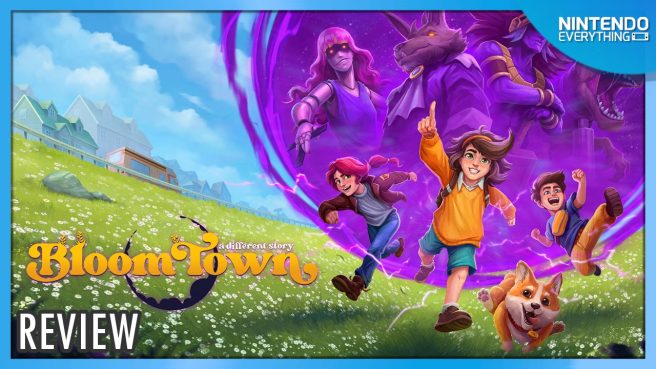[Review] Bloomtown: A Different Story
System: Switch
Release date: September 24, 2024
Developer: Lazy Bear Games
Publisher: Twin Sails
The feeling of déjà vu is not an uncommon one to experience when playing a game, particularly with indies, which have often drawn their inspiration from more successful and well-established franchises to create their own take on the formula. It’s not inherently a bad thing, but it was a feeling that I often had whilst I was playing Bloomtown: A Different Story. Despite a few questionable deviations here and there, it delivers an experience that at least matches its inspirations for enthusiasm and spirit, if not entirely in terms of satisfaction and enjoyment.
Bloomtown is a cozy, picturesque, and self-contained hamlet taken straight from the 1960s. It has its own local cinema, gym, and library; for all intents and purposes, it’s a perfectly ordinary town for the time period. For Emily and her younger brother Chester, who will be spending the summer there with their grandfather, it’s going to be home for a little while. But things are not entirely as they seem, as children around their age are mysteriously disappearing without a trace, and after a casual conversation with Lucifer which ends with being strong-armed into a contract with seemingly no downsides (absolute power in exchange for getting rid of a few demons seems fair, right?) our protagonists find themselves embroiled in a series of bizarre circumstances that unfold in the Underside, a sinister shadow realm that is gradually twisting life in Bloomtown into something much darker.
With your overarching goal of stopping these nefarious activities established within the first hour or so of play, Bloomtown will largely leave you to your own devices between major story moments as to how you go about preparing to do this, although the activities you’ll do during your free time feel less like preparation for these bigger moments and more simply exploring what the game has to offer, and making the most of your summer vacation: saving the world is just another thing on your to-do list when you’re young and carefree. Everything you do in Bloomtown contributes towards one of several social stats, opening up additional options during dialogue and in combat.
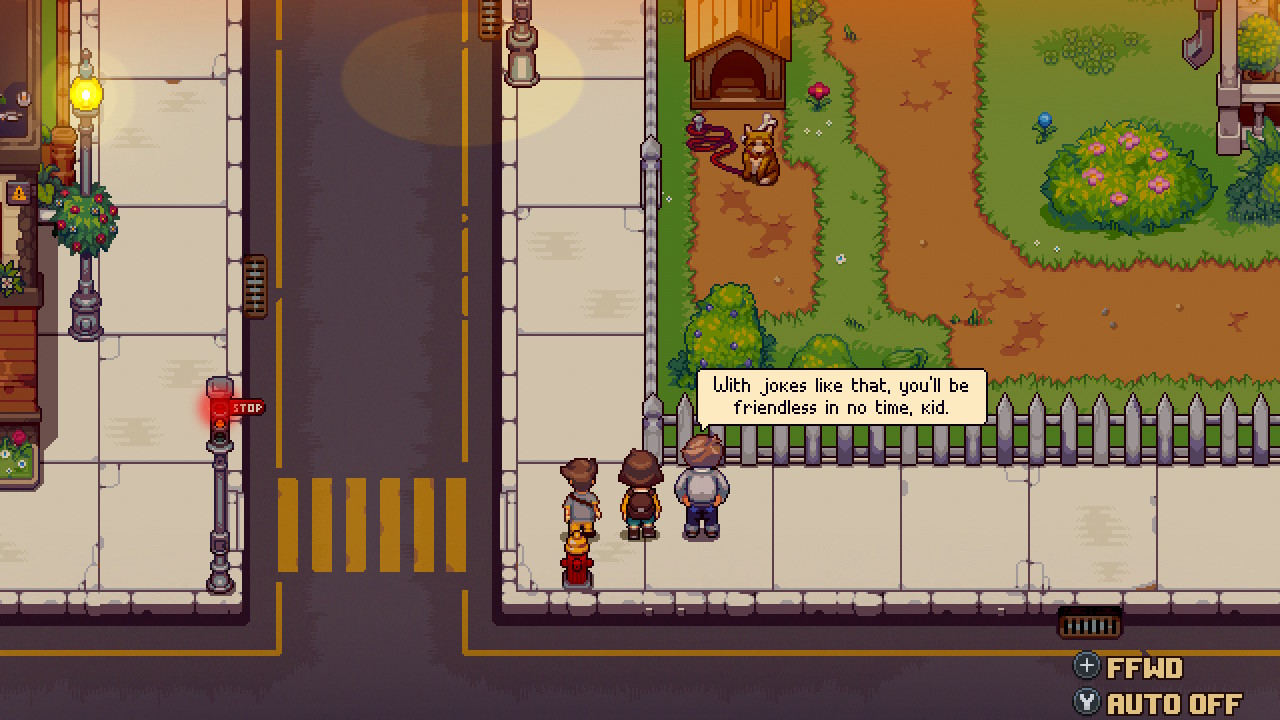
The world (or at the very least, the town) is your oyster, as there are a variety of things you can do, and the game has crammed almost every feasible activity in and leaves it to you to figure out how to best make use of your time. You can train in the local gym, indulge in a little farming, terrorize the local fish population, undertake any one of several small side quests for the various townsfolk; this is by no means an exhaustive list, but you’ll find you’re never short of things to do and the days go by much too quickly. In the manner of many time-limited games, it can feel quite overwhelming at times as you attempt to discover an optimal way to make use of your time – assuming, of course, that one exists at all. Although I often found myself wishing that I had dedicated a little more time to certain activities in Bloomtown to increase one stat or another and theoretically make life a little easier at points, I never felt as though I had wasted my time, which made moment-to-moment progression feel quite satisfying.
Unfortunately you’re going to be stuck with your choices whatever you ultimately decide to make, as the game functions entirely on autosave. It’s a design choice that I can appreciate from an abstract perspective, as that sense of urgency, and opportunities missed, does inspire you to make the most of your time. However, it would have been nice to have the opportunity to explore other options without needing to resort to starting an entirely new game, and for other, more compelling reasons I will dive into at a later point.
The game is determined not to let you forget anything, as it notably floods you with messages about tasks you have to do as they appear in those early hours. Although despite the distracting awkwardness of having a textbox flash on screen every few seconds, I never found this to be particularly overwhelming. The map is a bit difficult to navigate due to its blocky presentation in the menu screen, but selecting any outstanding objective will allow you to fast travel to it instantly, saving you the need to navigate back and forth between locations, and keeping the gameplay moving at a nice and steady pace. This makes completing the numerous side quests you’ll unearth a much more pleasant activity that doesn’t needlessly slow down the pace of the gameplay. This is a fortunate inclusion, because I would have been much less inclined to do them otherwise: moving through the various locations of both Bloomtown and the Underside is one of the more tedious aspects of the game as your character is painfully slow. It makes dungeon navigation in particular a trial at times when your character’s idea of sprinting is a slightly brisk walking speed.
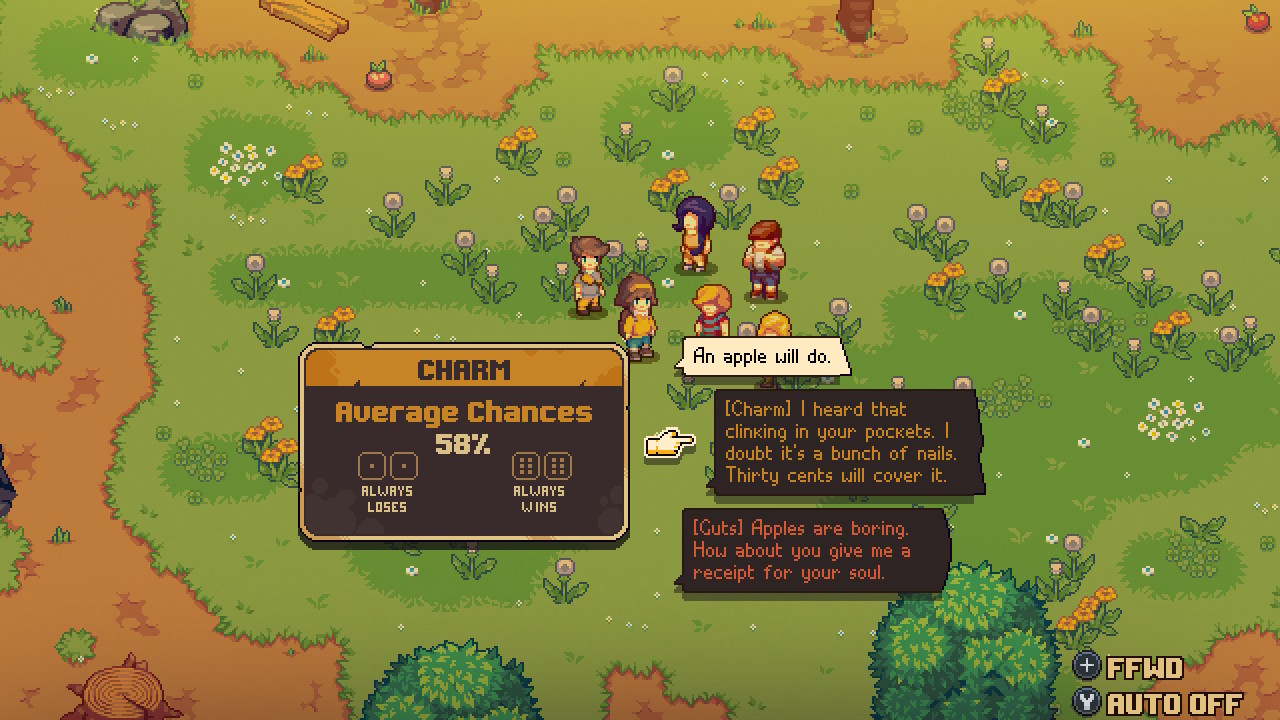
It’s a narrative and gameplay setup that is clearly inspired by the Persona series then. However, unlike its inspiration, Bloomtown manages to more closely tie the tone of these two elements together in a way that makes them feel far more natural and complementary; the segregation between dungeon-crawling and social sim isn’t quite so clear cut. Whether you’re plunging into the Underside to uncover the mysteries of the town or trying to catch a pigeon with an old birdcage and some wheat seeds, it all feels like one grand adventure that never breaks its stride. There is a light and whimsical charm to dialogue that keeps things from becoming too serious most of the time, giving the game the vibe of a Saturday morning cartoon show rather than a high stakes drama. Even when thrown into dangerous situations, the cast never loses that youthful innocence that makes them so endearing, making their escapades feel more like the product of an overactive imagination of some very bored children stuck in a sleepy town than dangerous, world-altering events much of the time.
Bloomtown was developed by Lazy Bear Games, the studio that brought us Graveyard Keeper and, more recently, Bandle Tale: A League of Legends Story. Both of those games featured stunning and highly detailed pixel art, and the team have certainly gone all out here as well. Lighting effects are particularly impressive in Bloomtown, with the town cast in a warm and pleasantly nostalgic glow which is almost photographic in its execution. This is in sharp contrast to the gloomy Underside, which is bathed in oppressive shadows for a completely different ambience that, although it isn’t quite sinister, definitely has an otherworldly quality that speaks of deeper menace, and serves as the perfect backdrop to exploring the unknown.
No matter where you are, Bloomtown also pulls you in with its suitably atmospheric soundtrack, with soft and gentle tones reminiscent of modern life sim titles playing in the background during your time spent in the town, and an upbeat vocal track (although can disable the vocals for an instrumental version if you’d prefer) playing during combat in the Underside. It’s arguably this more than anything else that sets Bloomtown apart from its contemporaries and inspirations, as it takes the familiar life sim/RPG hybrid gameplay and casts it within a world entirely its own, making it fresh and exciting even if you’ve put several hundred hours into Persona and visibly recoil at the thought of building up your social stats ready for another round of endless dungeon crawling.
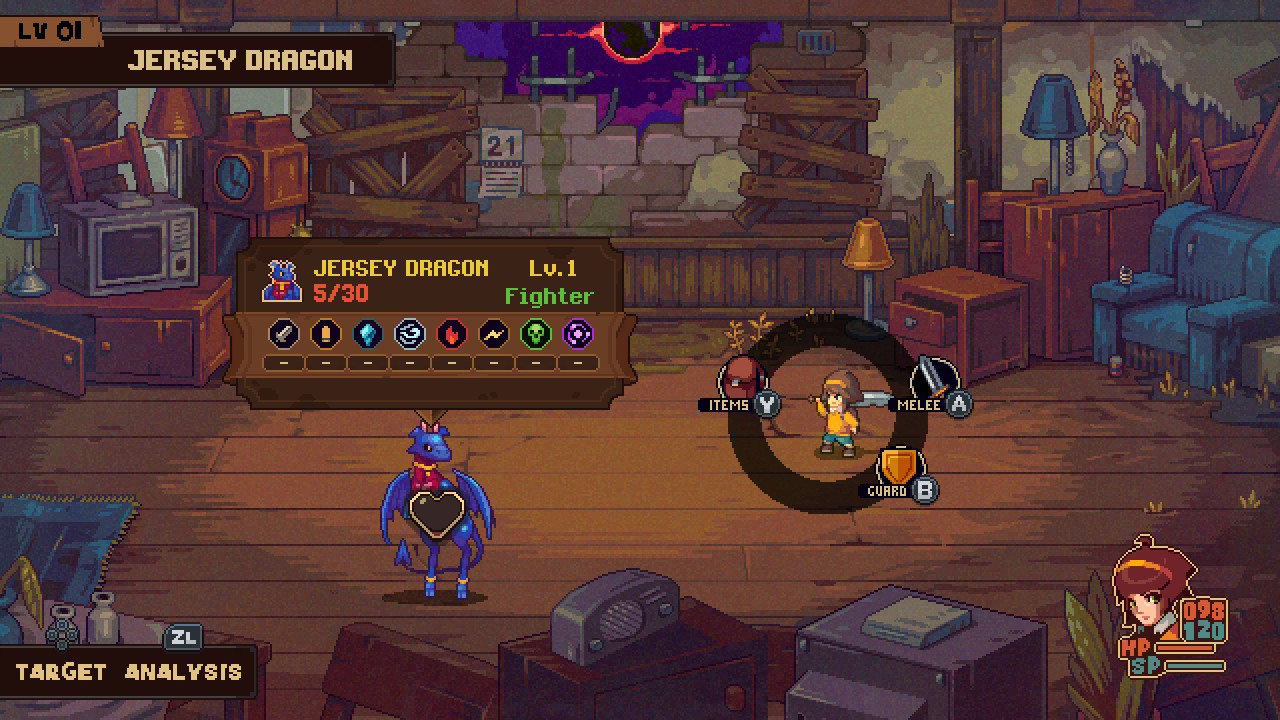
But as approachable as I found Bloomtown, the game seemed determined to put as many obstacles in my path as possible at times when it came to actually enjoying it, mostly in the form of some frustrating dice-based skill checks. Every time I was confronted with a dice roll meant that my enjoyment was about to be shattered as things were left entirely at the mercy of a random number generator, with the autosave meaning no chance of retrying. These checks are supposedly tied to your social stats, with the odds being more in your favor the higher these are, although the game seemed unable to differentiate between a 40 percent chance and a 70 percent chance in a lot of instances, and social stats grow at an extremely slow pace, making it difficult to enact any meaningful change on the outcome (if one were indeed possible) by raising them. It’s a little harder to let go of a negative result when control is taken from you entirely, and this frequently soured the experience for me, with only the occasional delight at succeeding in a skill check that I had no business even attempting with such a low probability of success.
The more interesting and influential conversation options were frequently determined by these dice rolls, which made them far less engaging, and I often felt railroaded into suboptimal choices because of unfavorable outcomes I was unable to influence. Demon recruitment in combat is also determined by this mechanic, and given the lengthy, often tedious nature of combat, it can feel particularly frustrating to be cheated out of a victory here after having spent several painful minutes whittling away your opponent. Overall it felt as though leaving things entirely to chance this way undermined the social stats system the game had incorporated, and that ultimately my efforts to improve in any particular direction were being entirely wasted by the need to fall back on praying that the dice landed in my favor.
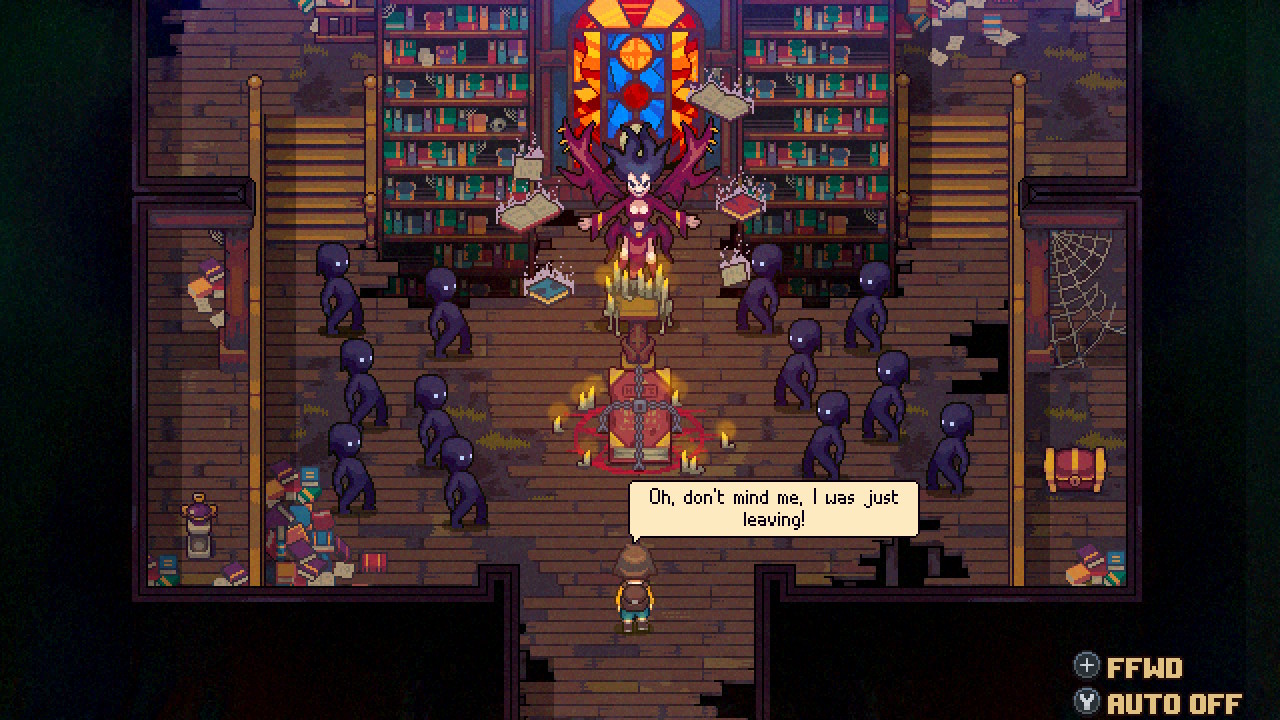
The turn-based combat is something of a mixed bag. The Persona influence is on full display here, as exploiting enemy weaknesses and executing combo attacks opens them up for all-out attacks, or leaves them open for negotiation for recruitment. As well as their partner guardians, which level up separately, party members can utilize an additional demon in combat, which can be swapped out between encounters and leveled up via a very basic fusion system that uses up unwanted demons. There’s a lot of potential for some interesting party combinations in the game, and most demons that you can recruit bring something unique to the table and are worth experimenting with.
However, it often feels as though it is trying to force complexity for its own sake by making battles drag on far longer than strictly necessary. Characters in Bloomtown have severe accuracy problems, and you’ll be spending more time missing your target than you will anything else. As a way to encourage players to exploit status debuffs and elemental weaknesses this would already be quite a heavy-handed approach, but the most frustrating thing about it is that doing this doesn’t seem to make much of a difference most of the time: as with the dice rolls, blind luck seems to play more of a factor in some instances. Combat in Bloomtown was the one aspect of it that I came to actively dread the longer I played, as each battle seemed to last twice as long as it should and very often, despite doing my utmost to exploit the game’s various systems to my advantage, it’d throw all of my effort back in my face with an inexplicable “miss” instead of a satisfying hit. It was never especially challenging, and nor was the punishment for failing a battle unduly harsh, but these design choices often prevented it from being particularly fun.
The Verdict

Despite my complaints, I always felt as though there was fun to be had in Bloomtown, and I never had to look very hard to find it. Each time I booted up the game to continue my adventure I wondered what surprises were in store for me, and there were usually plenty. It’s a title that is easy to engage with, and one I am sure will delight many fans of RPGs, particularly those with social elements weaved into them. Just be aware that at times the game is going to test your patience, and the outcome is not always going to be in your favor, even when by all rights it should be.
A copy of Bloomtown A Different Story review was provided by the publisher for the purpose of this review.
